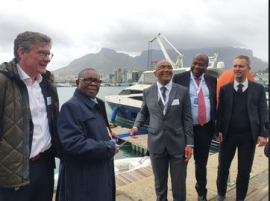
Higher Education, Science and Innovation Minister, Dr Blade Nzimande, has welcomed the Energy Observer, a hydrogen-powered boat that made a stopover at Cape Town’s V&A Waterfront for the first time.
The Minister also officially opened the one-of-a-kind vessel to the public from 12 - 20 June, free of charge.
The Energy Observer has been described as the first hydrogen-powered, zero-emissions vessel, which is self-sufficient and capable of drawing its energy from nature, while aiming to preserve it.
The Energy Observer has been sailing around the world since leaving its home port of Saint-Malo, France, in 2017, and has docked in over 40 countries across the globe.
The French vessel aims to raise awareness about the ecological transition issues and to explore solutions to demonstrate alternative energy for the future.
“I believe that the presence of the Energy Observer in South Africa will go a long way in creating awareness on the potential of a hydrogen economy,” Nzimande said on Monday.
He also welcomed efforts by Air Liquide, a French multinational company that supplies industrial gases and services, and the Energy Observer initiative that aims to highlight the need to transition to a carbon-free environment.
“As part of a national drive to create a clean, affordable and sustainable energy future for South Africa, the South African government, through my department, developed the Hydrogen Society Roadmap (HSRM) in 2021. Not only will green hydrogen valleys ensure the move away from fossil fuels, but it will create jobs, attract investment and bring development to rural provinces," the Minister said.
Through the HSRM, he said the department is also ensuring that hydrogen can be utilised as a lever for social justice in the context of South Africa’s transition to cleaner energy sources.
Nzimande said the 2019 White Paper on Science, Technology and Innovation (STI) emphasises the core themes of inclusivity, transformation and partnerships within the National System of Innovation (NSI).
“We are implementing our White Paper through our Decadal Plan, which serves as a government-wide roadmap fostering interdepartmental collaboration and driving STI [science, technology and innovation] policy and programmes over the next 10 years.
“The Decadal Plan has specific areas of focus and development, seeking to address a number of the challenges facing South Africa, from the current energy crisis to how we respond to natural disasters and prepare for future pandemics.”
He stressed the importance of the establishment of partnerships across the public and private sectors.
Through the Just Energy Transition, Nzimande believes South Africa can rebrand itself as a destination for sustainable investment that incorporates environmental, societal and good governance (ESG) principles.
He said the country’s journey towards the hydrogen economy is a culmination of a long-standing investment by the DSI for advancing national development and global competitiveness.
The Minister described the DSI-led Platinum Valley Initiative (PVI), South Africa’s version of a Hydrogen Valley, as one of the initiatives that are expected to spur the country’s move towards a hydrogen economy and the implementation of the HSRM.
A feasibility study on the Hydrogen Valley, which was completed in partnership with Anglo American Platinum, Bambili Energy and Engie Energy Services SA, was officially launched on 8 October 2021.
The project, which will cost about $1.2 billion to implement, is said to contribute between $3.9 billion and $8.8 billion to gross domestic product (GDP) by 2050, and create approximately 14 000 to 30 000 jobs per year by 2030.
“Some of the potential collaboration projects along the Hydrogen Valley corridor, which could serve as low-hanging fruits, are the heavy duty and mining trucks conversion with refuelling stations,” Nzimande said.
Meanwhile, he said the Coal CO2 to X RDI Programme, which employs CCU [carbon capture and utilisation] technology to capture carbon dioxide (CO2) from flue gas and convert it into sellable commodities, such as fertilisers, provides an opportunity to link the existing coal sector with the incoming hydrogen economy. – SAnews.gov.za


